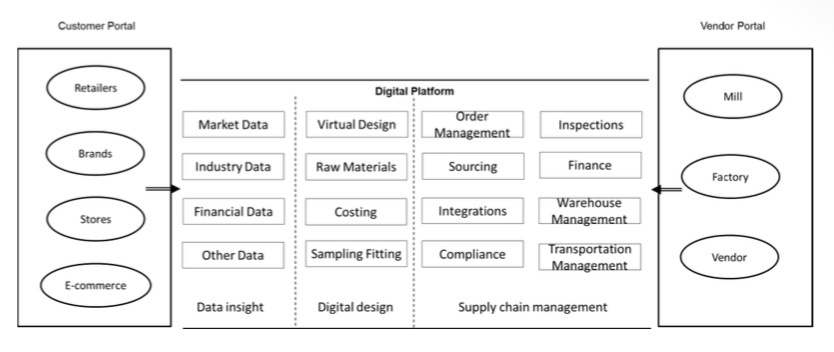Company D is an international supply chain management company with actions and detailed plans for digitalization. It has invested in new technologies for years and is building a digitalized platform for global supply chain from raw materials at a mill to consumer behaviors, providing seamless data and information for customer needs.
As introduced by the technology director of the company, the fashion industry has fundamentally changed due to various technologies such as the Internet of Things, cloud computing, social media, mobile devices, data analytics as well as the changing consumer behaviors of millennials. More and more consumers heavily rely on smartphones and apps for life, from shipping, travelling, work and almost everything. The fashion supply chain should be digitalized to meet the new market demands and change the relationships and interconnections between material providers, designers, manufacturers, brands, retailers and end consumers.
The company aims to create a fully digital platform to connect stakeholders and every process together with data insights. It believes the future supply chain will be a multidimensional system where suppliers and vendors can connect to each other with transparency and data analytics. The system is illustrated as follows.
To realize this digital platform, some technologies have been addressed as the most important ones to develop and improve in the near future. First of all, data insight and market intelligence is the key factor for future supply chain management. For the fashion industry, many new problems emerge, like how to deliver the right product at the right time at the right price and to the right consumer in the right access with the right logistics, for which big data analytics can help. For example, the company is collecting customer data through in-store, mobile, e-commerce and customer service, and developing statistical modeling to forecast models for sales, inventory, risk analysis and shipment for logistics business. Different data will be shared with analytics to serve its customers including brands, retailers, suppliers and vendors on its digital platform. Secondly, virtual design technology is essential for the future fashion supply chain bringing speed, innovation and digitalization. A virtual sample can be created in a much shorter time than traditional physical samples and has multiple iterations in colors and patterns for different user accounts. With virtual simulation, the sample can be virtualized how it looks, fits and moves on a real person. The technology makes the entire process from design to production faster and more efficient, and provides opportunity for global working and communication simultaneously. Besides, other technologies, such as 3D printing allowing personalized fashion come true, automation and robotics in warehouse and last mile delivery, and the Internet of Things connect billions of devices with big data analytics will facilitate the entire supply chain process to become digital in near future.
Company D is a pioneer in digital fashion supply chain management, and its business model has changed disruptively by using new technologies. It shows a possible framework of fashion supply chain in the near future and indicates the urgency of digitalization across different industry sectors for each fashion participant. From its experience, big data and analytics would become the core competitiveness of the industry in the very near future.
